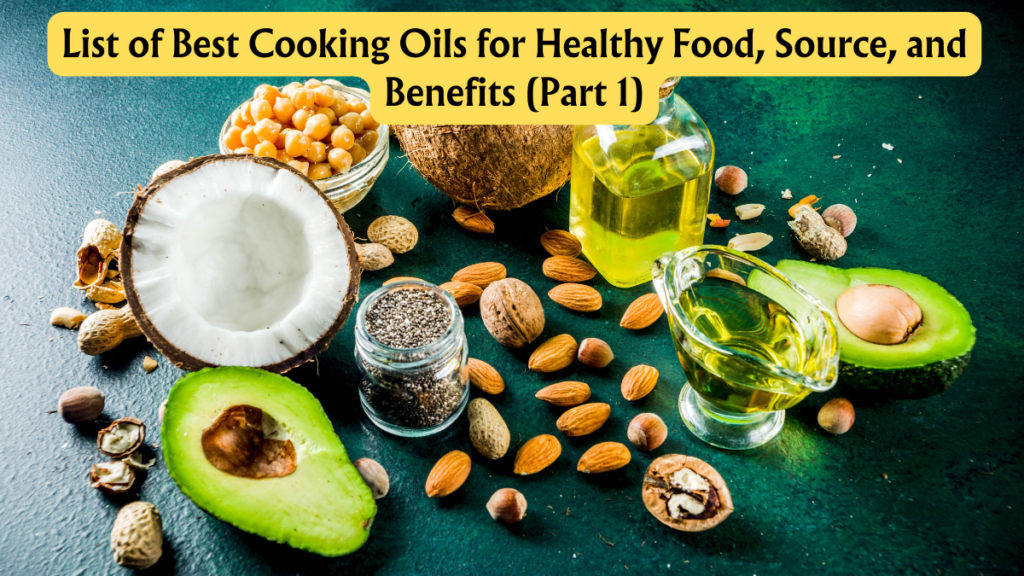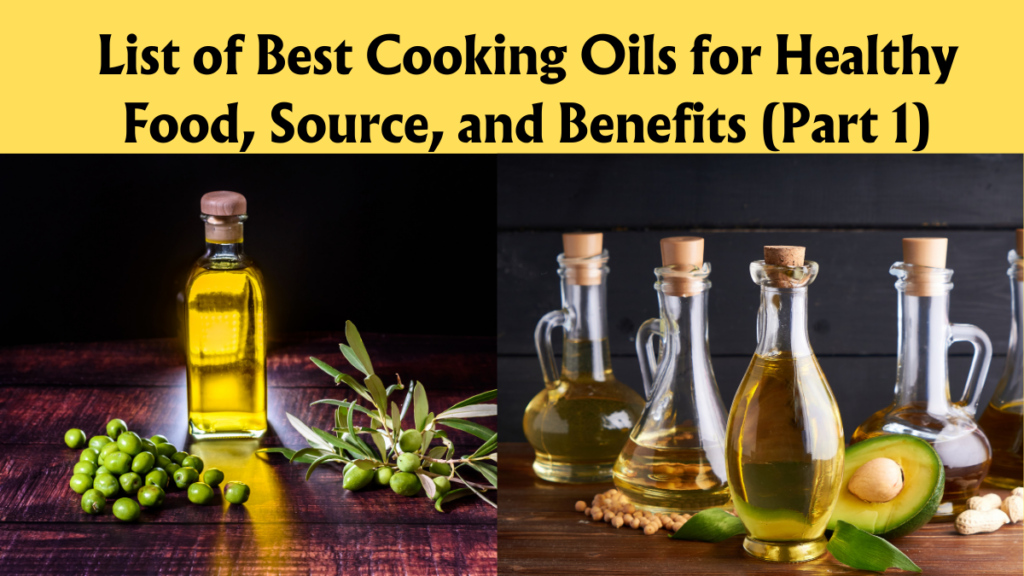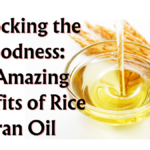List of Best Cooking Oils for Healthy Food, Source, and Benefits (Part 1)
Introduction: Cooking oil is a staple in every kitchen, playing a crucial role not only in enhancing the flavors of our favorite dishes but also in determining their nutritional value. The choice of cooking oil can significantly impact our health, influencing factors such as heart health, inflammation, and overall well-being. In this article, we will explore a comprehensive list of the best cooking oils, their sources, and the myriad benefits they offer.
Understanding Different Types of Cooking Oils
Regarding cooking oils, the market offers a wide array of options. From the popular olive oil to the versatile canola oil and the exotic coconut oil, understanding the differences in their nutritional profiles is essential. Each oil brings a unique set of attributes to the table, making it crucial to make an informed choice based on individual health needs and culinary preferences.

Healthiest Cooking Oils
In the quest for healthier cooking options, certain oils stand out for their exceptional nutritional content and benefits. Olive oil, often hailed as the golden elixir of the Mediterranean, boasts an abundance of monounsaturated fats and antioxidants. These components contribute to improved heart health and reduced inflammation, making it a top choice for health-conscious individuals.
Benefits of Olive Oil
The benefits of olive oil extend beyond its delightful taste. Its rich monounsaturated fats, specifically oleic acid, have been linked to lower risks of heart disease. Additionally, the antioxidants present in olive oil, such as polyphenols, combat oxidative stress and inflammation within the body. Incorporating olive oil into your cooking enhances flavor and supports your overall well-being.

Avocado Oil: A Nutrient Powerhouse
Another heavyweight in the realm of healthy cooking oils is avocado oil. This oil, extracted from the creamy flesh of avocados, is celebrated for its high monounsaturated fat content. These healthy fats contribute to improved cholesterol levels and heart health. Avocado oil also contains an array of vitamins, including vitamins E and K, as well as potassium, providing a nutrient-packed boost to your dishes.
Canola Oil for Balanced Nutrition
Canola oil, derived from the rapeseed plant, is a versatile and heart-friendly option. Low in saturated fats and high in unsaturated fats, canola oil has been associated with a reduced risk of cardiovascular diseases. Its neutral flavor makes it suitable for various cooking methods, from frying to baking, ensuring a balanced nutritional profile in your meals.
Coconut Oil: Myths and Realities
Despite being surrounded by myths, coconut oil has its health benefits when used judiciously. Contrary to misconceptions, coconut oil can be part of a healthy diet. It contains medium-chain triglycerides (MCTs), which are easily digestible and may promote weight loss. However, moderation is key, as coconut oil is high in saturated fats, and excessive consumption may negate its potential health benefits.
Grapeseed Oil: A Hidden Gem
Grapeseed oil often flies under the radar, but its unique qualities make it a hidden gem in the world of cooking oils. With a high smoke point, grapeseed oil is suitable for high-heat cooking methods like frying. Beyond its culinary applications, it is rich in polyunsaturated fats and vitamin E, offering potential health benefits, including antioxidant properties.
Sesame Oil and its Unique Flavor
Sesame oil, known for its distinctive nutty flavor and aroma, is a popular choice in Asian cuisine. Beyond its culinary appeal, sesame oil brings health benefits to the table. Rich in antioxidants and essential fatty acids, it offers anti-inflammatory and heart-protective properties. Incorporating sesame oil into your cooking can elevate both the taste and nutritional value of your dishes.
Choosing the Right Oil for Specific Dishes
The versatility of cooking oils extends beyond their nutritional profiles to their suitability for different cooking methods. When frying, opt for oils with high smoke points like peanut oil or sunflower oil. For baking, consider using oils with mild flavors such as canola or vegetable oil. Understanding the best oil for each cooking method enhances the overall cooking experience and ensures optimal results.
Considerations for Cooking Oil Storage
The quality of cooking oil can be compromised by improper storage. Factors such as exposure to light, heat, and air can accelerate the degradation of oils, affecting both taste and nutritional value. To maintain the freshness and quality of your cooking oils, store them in cool, dark places, away from direct sunlight and heat sources. Additionally, sealing the bottles tightly can prevent the entry of air and extend the shelf life of the oil.
Common Mistakes to Avoid
In the pursuit of healthy cooking, certain common mistakes can compromise the benefits of your chosen oils. Overheating cooking oil beyond its smoke point can lead to the formation of harmful compounds and a loss of nutritional value. Another pitfall to avoid is mixing incompatible oils, as this can create unfavorable flavors and potentially harmful substances. Being mindful of these mistakes ensures that you maximize the health benefits of your chosen cooking oil.
Quality Control: Reading Labels
Making informed choices about cooking oils starts with understanding labels. Reading labels allows you to identify additives, preservatives, and the overall quality of the oil. Look for terms like “cold-pressed,” “extra virgin,” or “unrefined” for oils that retain more of their natural goodness. By decoding labels, you empower yourself to select oils that align with your health goals and culinary preferences.
Eco-Friendly and Sustainable Options
Beyond personal health, considering the environmental impact of your cooking oil choices is increasingly important. Opt for oils produced through eco-friendly and sustainable practices. This ensures that your culinary adventures are not only good for you but also leave a minimal ecological footprint. Supporting sustainable practices in the oil industry contributes to a healthier planet for future generations.
Conclusion
In conclusion, the journey to healthy cooking involves more than just choosing the right ingredients; it extends to the selection of the cooking oils used in your kitchen. By understanding the unique qualities, nutritional profiles, and recommended uses of various cooking oils, you empower yourself to make choices that align with your health and culinary goals. Whether you opt for the richness of olive oil, the versatility of canola oil, or the exotic flavors of sesame oil, each choice contributes to the overall well-being of yourself and your loved ones.
FAQs:
1. Can I use olive oil for frying?
– While olive oil has a moderate smoke point, it’s best used for light sautéing or drizzling over dishes. For high-heat frying, oils with higher smoke points like peanut or grapeseed oil are more suitable.
2. Is coconut oil healthy despite its saturated fat content?
– In moderation, coconut oil can be part of a healthy diet. Its medium-chain triglycerides (MCTs) may offer certain health benefits, but excessive consumption should be avoided.
3. What should I look for when reading cooking oil labels?
– Look for terms like “cold-pressed,” “extra virgin,” or “unrefined.” These indicate higher-quality oils that retain more of their natural nutrients.
4. Can I mix different cooking oils?
– While some culinary enthusiasts experiment with oil blends, it’s generally advisable to avoid mixing incompatible oils, as it can lead to undesirable flavors and potential health risks.
5. How can I store cooking oil to maintain its freshness?
– Store cooking oil in a cool, dark place away from direct sunlight and heat. Ensure the bottle is tightly sealed to prevent the entry of air, which can accelerate oil degradation.






